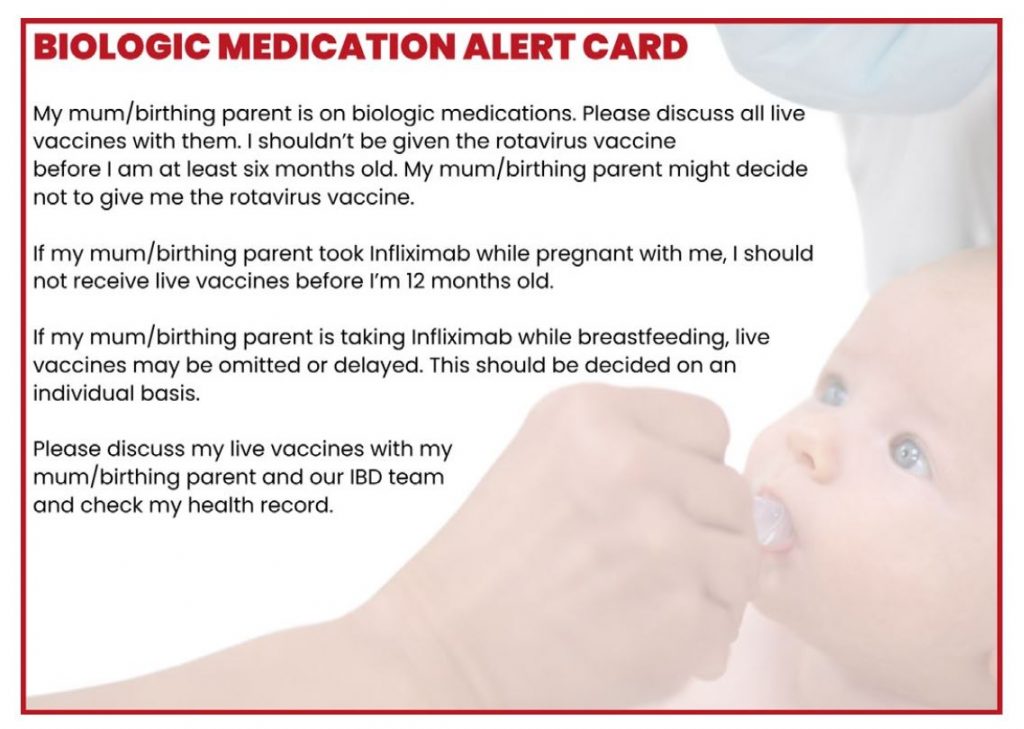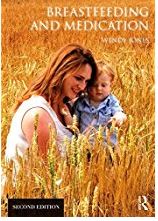To finish the posts on immunosuppresant medications the final most frequently asked question is about the administration of live vaccinations to the baby. This is particularly a problem with the rotavirus vaccine.

In August 2022 the summary of product characteristics for Infliximab was changed to state that live vaccines should not be administered to the babies of mothers on Infliximab in pregnacy or breastfeeding, before 12 months of age. https://breastfeeding-and-medication.co.uk/wp-content/uploads/2022/10/Infliximab-exposure-in-pregnancy-and-breastfeeding-Aug-2022-update.pdf
The Torento consensus statement recommended that live vaccinations are not recommended within the first 6 months of life in the offspring of women who were on anti-TNF therapy during pregnancy. The babies of mothers taking immunosupressant drugs eg azathioprine and infliximab have not been shown to be immunocompromised because of the limited passage of medication through breastmilk.
However, if live vaccinations, particularly rotavirus are used then the mother with IBD should use precautions like wearing gloves when changing the baby’s nappy for 2 weeks after the vaccination to avoid picking up the particles of live virus shed in faeces.
The Rotavirus Vaccination Programme Public Health England
” There is a potential for transmission of the live attenuated virus in Rotarix vaccine from the infant to severely immunocompromised contacts through faecal material for at least 14 days. However, vaccination of the infant will offer protection to household contacts from wild-type rotavirus disease and outweigh any risk from transmission of vaccine virus to any immunocompromised close contacts. Those in close contact with recently immunised infants should, as always, observe good personal hygiene which should include handwashing after changing the infant’s nappy”
” Rotavirus vaccine should not be given to infants of mothers that used immunosuppressive biological therapy during their pregnancy because of the potential that these will have a postnatal influence on the infants’ immune status. It is recommended that immunisation with live vaccines should be delayed for 6 months in children born to mothers who were on immunosuppressive biological therapy (TNFα antagonists and other biological medicines such as Infliximab) during pregnancy. As Rotarix vaccine is contraindicated in infants presenting for the first dose after 15
weeks of age (beyond 14 weeks and 6 days), infants whose mothers received such treatment during pregnancy will therefore not be eligible to receive Rotarix vaccine, but they should benefit from herd (indirect) protection.”
” Infants born to mothers who received non-biological immunosuppressive therapy such as steroids, cyclosporine, tacrolimus or azathioprine at any time during their pregnancy can safely have the rotavirus vaccine at the appropriate age. https://www.gov.uk/government/publications/rotavirus-qas-for-healthcare-practitioners/rotavirus-vaccination-programme-information-for-healthcare-professionals
A recent review of the literature concluded that it is safe for mothers to breastfeed while on immune suppression that includes steroids, cyclosporine, tacrolimus or azathioprine. Breastfed infants of mothers taking immunosuppressive therapy can receive rotavirus vaccine at the appropriate age. Rotarix vaccine should not be administered to breastfeeding infants whose mothers are using biological medicines such as Infliximab.”
https://www.medicines.org.uk/emc/dhpc/2511/Document
- Sameh M, Mohsen EK, Jon JK, Halawa A, Sharma Al. Safety of Breastfeeding by Mothers on Immunosuppressive
Medication for Renal Transplantation: Obsession, Myth and Truth. JOJ Uro & Nephron. 2017; 3(3): 555612. Available at
www.juniperpublishers.com/jojun/pdf/JOJUN.MS.ID.555612.pdf
- Public Health England. Immunisation against infectious disease. Contraindications and Special Considerations. Chapter 6.
www.gov.uk/government/publications/contraindications-and-special-considerations-the-green-book-chapter-6
- Nguyen GC, Seow CH, Maxwell C, Huang V, Leung Y, Jones J, Leontiadis GI, Tse F, Mahadevan U, van der Woude CJ The Toronto Consensus Statements for the Management of IBD in Pregnancy. Gastroenterology. 2016;150:734-57
- Julsgaard M, Christensen LA, Gibson PR, Gearry RB, Fallingborg J, Hvas CL, Bibby BM, Uldbjerg N, Connell WR, Rosella O, Grosen A, Brown SJ, Kjeldsen J, Wildt S, Svenningsen L, Sparrow MP, Walsh A, Connor SJ, Radford-Smith G, Lawrance IC, Andrews JM, Ellard K, Bell SJ. Concentrations of Adalimumab and Infliximab in Mothers and Newborns, and Effects on Infection. Gastroenterology. 2016 Jul;151(1):110-9. doi: 10.1053/j.gastro.2016.04.002. Epub 2016 Apr 8. PMID: 27063728.
- Fritzsche J, Pilch A, Mury D, Schaefer C, Weber-Schoendorfer C. Infliximab and adalimumab use during breastfeeding. J Clin Gastroenterol. 2012 Sep;46(8):718-9. doi: 10.1097/MCG.0b013e31825f2807. PMID: 22858514.
- Selinger CP, Bel Kok K, Limdi JK, Kent A, Cooney R, Nelson-Piercy C. Live vaccinations for infants exposed to maternal infliximab in utero and via breast milk – the need for nuanced decision making. BMJ Open Gastroenterol. 2022 Oct;9(1):e001029. doi: 10.1136/bmjgast-2022-001029. PMID: 36216381; PMCID: PMC9557327.
- https://assets.publishing.service.gov.uk/media/5a80848aed915d74e622eea8/Green_Book
